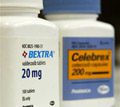 - Client Reviews
- Client Reviews April 7, 2005 Pfizer Canada Inc. has agreed to Health Canada’s request to stop sales of its painkiller Bextra until safety issues have been resolved.
April 7, 2005 Pfizer Canada Inc. has agreed to Health Canada’s request to stop sales of its painkiller Bextra until safety issues have been resolved.
The company’s parent Pfizer Inc. suspended sales of Bextra in the United States and the European Union at the request of the Food and Drug Administration and European regulators. Pfizer said Thursday the FDA, in seeking the withdrawal, cited a risk of serious skin reactions to Bextra. Pfizer’s Bextra sales were $1.3-billion (U.S.) last year.
The FDA has been studying the safety of so-called Cox-2 inhibitors since Merck & Co. voluntarily pulled Vioxx from the market Sept. 30 after heart problems were reported in some users. Once blockbuster sellers, the painkillers were particularly popular among arthritis sufferers.
“Following the request from Health Canada, we’ve agreed to suspend sales of Bextra in Canada,” Pfizer Canada spokesman Michael Amos said in an interview. “We disagree with Health Canada’s position. However, we will comply with the request.”
In February, 38,781 Canadian prescriptions for Bextra were dispensed, according to the most recent figures from IMS Health, a data research firm. In all of 2004, Bextra was dispensed 665,783 times in Canada, IMS said.
Pfizer Canada said it would issue a press release providing more details about the sales suspension Thursday. “We’re currently working out a plan for the suspension of sales,” Mr. Amos said.
Patients shouldn’t discontinue taking Bextra without consulting with their physician, said Jirina Vlk, a Health Canada spokeswoman. On Dec. 10, Health Canada issued an advisory about the drug.
The U.S. government also wants other drugs in the same class to carry the strongest possible warnings about increased risk of heart attack and stroke among the millions of people who rely on them.
In New York, Pfizer Inc.’s shares fell 61 cents or 2.3 per cent to $26.25 (U.S.). By early afternoon, more than 36.8 million shares had changed hands, compared with the three-month daily average of 28.4 million.
In addition to the prescription drugs, the FDA asked manufacturers of over-the-counter non-steroidal anti-inflammatory drugs to revise their labels to include information about the risks of cardiovascular incident and gastrointestinal bleeding.
“Today’s actions protect and advance the health of the millions of Americans who rely on these drugs every day,” said Dr. Steven K. Galson, acting director of FDA’s Center for Drug Evaluation and Research.
The risks posed by Bextra outweigh its benefits, the FDA said.
In Canada, prescriptions for Bextra jumped as high as 88,036 for the month of October last year as patients stopped taking Vioxx and switched to Bextra, according to IMS Health figures. But as warnings about the potentially harmful side-effects of Bextra mounted, the number of prescriptions fell by more than half from November to February.
“For now, patients should stop taking Bextra and contact their physicians about appropriate treatment options,” Pfizer Inc. said in a statement Thursday.
Pfizer said it planned further discussions with the FDA about the possibility of returning Bextra to the market.
“Pfizer respectfully disagrees with FDA’s position regarding the overall risk-benefit profile of Bextra,” the company said.
In February, advisers to the FDA had recommended that people who depend on Celebrex, Bextra and Vioxx be allowed to continue to use them despite the health risks.
The panel said Vioxx posed the greatest risk and that Celebrex had the fewest side effects. It recommended that the prescription drugs carry strong warnings and that more study be done to get a better understanding about the drugs.
Janet Skidmore, a spokeswoman for Whitehouse Station, N.J.-based Merck, said the company had no immediate comment on whether the Bextra decision would influence any consideration to bring Vioxx back, or whether it will continue to seek approval for Arcoxia, a planned successor to Vioxx.
Merck shares fell 42 cents, or 1.3 per cent, to $32.47 in morning trading on the NYSE, but are above their 52-week low of $25.60 reached in November.
The FDA’s move is a significant blow for New York-based Pfizer which had just announced a plan to return to double digit earnings growth by next year, in part by reviving sales from Bextra and Celebrex.
Sales of both drugs went into a free-fall last year after being linked to heart problems. Last year, Celebrex sales totalled $3.3-billion while Bextra sales were $1.3-billion. Analysts had been expecting sales of both drugs to sink this year because of safety concerns but now the situation is even worse than previously anticipated.
Pfizer will lose the vast majority of its Bextra sales for the year but Celebrex sales will take a huge hit as doctors and patients question the safety of the only remaining Cox-2 inhibitor on the market.
“If you are a doctor looking at this, how can you think there are problems with two and not the third,” Jason Napodano, an analyst with Zacks Investment Research, told the Associated Press.
Mr. Napodano had expected Celebrex sales of $2-billion but they could be slashed to only $1-billion. He expected Bextra revenue of $605-million but most of that has just evaporated. He believes the FDA decision will shave at least 5 cents from Pfizer earnings this year.
Pfizer also announced $4-billion in cost cuts as part of its turnaround. Mr. Napodano said the company will have to make more cuts if it wants to met its goal of returning to double-digit growth.
Mr. Napodano never believed that Vioxx would return to the market so he doesn’t view the FDA decision as having any implication for Merck.

